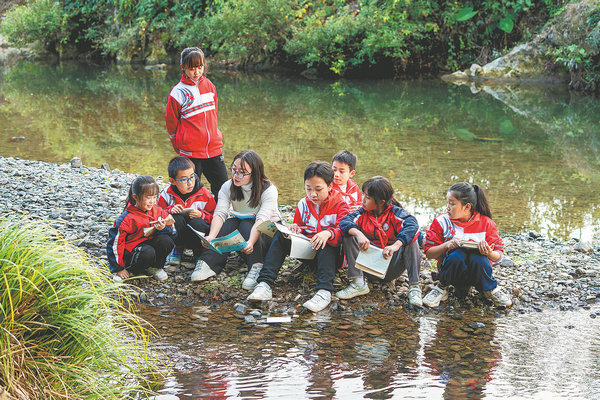

She began to think about changing her way of teaching to make the children more interested in her classes. "Grades are important but not the most important thing, and I hope to find a way to open their hearts and a way for them to find emotional release."
"The cotton spits out the harvest." This figurative expression by one of the girls caught Li's attention and provided inspiration.
"Children think differently from adults, and I found that they had a flair for expression, so I thought if they could write poems, it might be interesting."
In the beginning, they could only write short sentences, but through reading, imitating and practicing, the students could soon compose complete poems. And Li further incorporated creative writing into her art, music and sports classes.
To instill love for poetry in their minds, she brought the classroom into the fields and by the riversides, letting them experience the cool breezes blowing across the ridges, the leisure of waiting for a cloud to float overhead, and the joy of catching a bee among the flowers.
Li encouraged her students to awaken their senses, observe and record the world around in a poetic manner, and use their imaginations to express their thoughts, even in a childish or immature way.
"The clouds burst into silver rain, and colorful flowers sprout out of the ground," one of the children wrote. Such imaginative verses thrill Li.
A six-grade student's poem about the bond between him and his grandma touched Li deeply. The boy, Long Yiyang, wrote: "She's of snowwhite hair, mine's of the darkest hue. She walks in autumn's dusk, I stand at spring's dawn. She's a flower in full bloom, I am a tender grass. She is a flame in the dark night, I am morning's light. Years lie between us, as long as galaxies, yet her love spans the Milky Way and enfolds me."
Li describes writing poems as a way to lead children to connect with nature and the world, and to enrich their life experience. "Poems can also serve as a hidden and safe emotional outlet for them."
"If writing poems can serve as a catalyst to guide them toward a new life, into the world of literature, and to see the diversity of the world, it will be of great significance to their growth."
Through their shared love of reading and writing, Li and her students have grown together, sharing their joys and sorrows.
Li started a poetry society in her school to attract more children that have a zest for poems. Over the past six years, the students have written over 1,600 poems. Li has compiled nearly 500 works into five collections of poems, and some of them have been published in national and provincial journals.
In November 2022, Li and seven emerging writers in her school attended the ceremony of the Lu Xun Literature Prize, which is one of the country's most prestigious literary awards. It was the first time the child poets had left their hometown to travel to the Chinese capital.
Speaking of why she devotes so much effort to teaching poetry, Li says that education is not just about grades but about nurturing the children's creativity and confidence, and she is trying to guide them to recognize and tap their potential. Li says she hopes they will feel a sense of belonging and connection to their rural home, and that the rural village is also a good environment for them to grow up freely and confidently.
As a teacher who has stayed in rural schools for over five years, Li is also aware of the plight facing young teachers in rural places.
Education methods and management in rural schools are relatively backward, which cannot meet young teachers' needs for self-development.
With limited resources, they are forced to find more teaching materials with high quality, pursue a better teaching environment and achieve better teaching effects, and are often trapped in self-doubt and feel abandoned by the outside world, she says.
It is also crucial to build up their confidence, she says.
Li also faces her own dilemma: While exploring more creative teaching methods, she also has to tackle more complicated and heavy work since she became dean of studies, which has given her a lot of stress.
But the attention her predecessors paid to rural education and the efforts they made, as well as the trust, love and positive feedback from the pupils gives her the motivation to carry on.
Li says that she will continue to introduce literature to more kids through reading and writing.
In addition, Li says she hopes that her practice will attract more teachers to explore their own creative teaching methods, and believes education in rural areas will improve through such efforts.
Zhu Youfang contributed to this story.